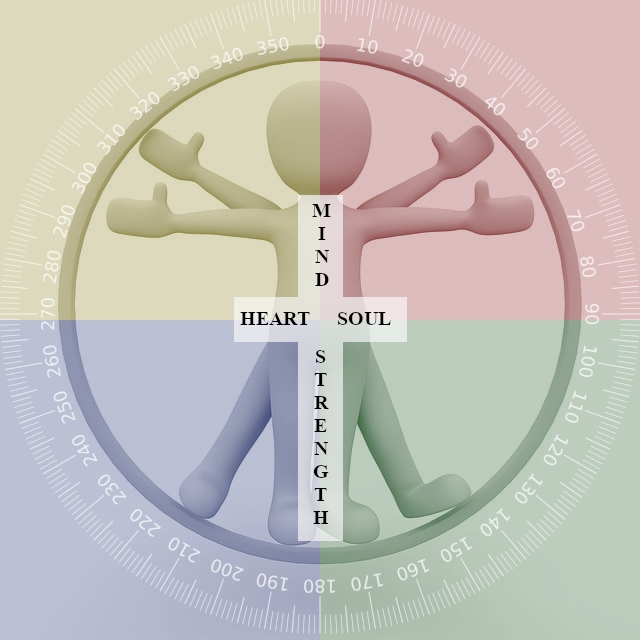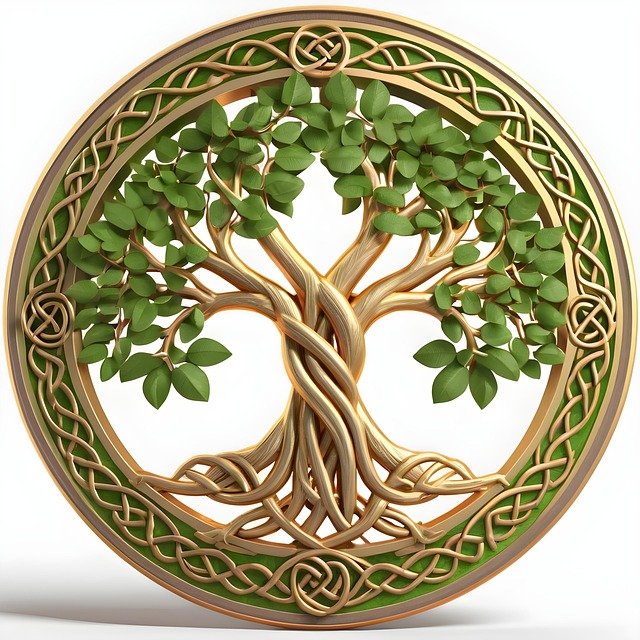Chapter 1:


The creation account carries with it a lot of controversy. There’s the “Young Earth” vs. the “Old Earth” argument. There’s the textual challenge of chapter 1 vs. chapter 2 where the creation account appears to contradict itself. There are assuredly more than I’ve listed. No matter what they are, the fact is, here we are. There’s no getting around it. How did we arrive here? From where did we come? What’s our purpose?
I wasn’t there at the creation event so, I have no firsthand knowledge of it. God has been gracious enough to give us the record he wants us to have albeit, it’s an extremely minimalistic account. He apparently believes it’s more than sufficient for us to come to faith. Think what it would be like if God had decided to include a thorough examination of Einstein’s Theory of Relativity and made understanding it a requirement for salvation. I’m personally grateful for his minimalist approach.
For the record, “we” (at the moment I-alone, being the sole representative of simplifiedtheology.org) hold the view of creation espoused by Dr. Hugh Ross of Reasons to Believe 1. “We” officially believe the old earth view of creation. If you’d like to learn more please search You-Tube for “Dr. Hugh Ross-The Science of Creation”. https://www.youtube.com/watch?v=-Em-Ltg4oGo Also, “Hidden Treasures in the Book of Job Dr. Hugh Ross”, https://www.youtube.com/watch?v=COawIpD9hNM and lastly, “Space, Time and How New Scientific Discoveries Prove the Science of God”. https://www.youtube.com/watch?v=qZuaGchv0as
So…
What’s the point of a “study” on the book of Genesis if I’m going to defer to someone else regarding the creation account? What am I going to contribute that’ll be worthwhile? Excellent questions. Genesis has a lot more to offer than an overly simplified account of the creation. Metaphysical themes and basic principles are introduced which are still affecting us today because they’re timeless. THAT-will be my angle (so to speak) more than anything else.
1 In the beginning God…
-Genesis 1:1 (NKJV)
The first thing we must come to terms with is the fact that God simply…IS. Unfortunately, this is a dealbreaker when it comes to our faith. If we cannot or will not acknowledge that God IS, we cannot have faith in Him. Granted, just starting in our faith journey we may not be there-yet. Let’s start from where ever we are and let our faith grow. God is aware and will meet us where we are and guide us. He’s made it clear this is his will for all of us.
The first theme to be introduced, is that of division. Before creation there was God. During and after creation there was division, compartmentalization, the setting of boundaries. This only works in one direction however. We as finite, created beings are limited by boundaries of various kinds. God, on the other hand, continues to be omni-present. This is one more thing the human ego simply needs to come to terms with and accept because there’s no way around it. Whenever God divided/ separated/ set a boundary for something, he declared it to be “good”. A theme which will come up a little later will be that of unity being evil. What…?! We’ll get there, don’t worry.
The above does not necessarily mean all division is good or that we should be divided all the time. It also does not mean all unity is bad and that we should be continually “unified” no matter the subject. This requires wisdom and is beyond the scope of this chapter at this point in time. As I said, we’ll get there…don’t worry.
Next, comes the creation days. God views each one as good. Let’s look at those:
- Day 1-Light-it was good.
- Day 2-Seperated water from water creating the firmament.
- Day 3-Waters gathered under the heavens and dry land and vegetation appears-it was good.
- Day 4-Sun, moon, stars revealed-it was good.
- Day 5-Living creatures on the earth-it was good.
- Day 6-Man (male and female) in the image of God-it was very good.
Lastly, the charge to “rule” over the earth and “subdue” it. The inhabitants were called to tend the Garden and care for it, to use it for their benefit and to grow and thrive. “Rule” and “subdue” did not involve tyranny or oppression, that would come later. It was a call to be confident in their actions and to proceed with certainty with God’s blessing.
Images courtesy various artists on Pixabay.
1. Dr. Hugh Ross and his ministry Reasons to Believe @ www.reasons.org (as well as any others which may exist) do not endorse, and are not affiliated, in any way, with simplifiedtheology.org. All intellectual property of Dr. Hugh Ross and Reasons to Believe, et al. remains the sole property of those respective individuals/ organizations.
Chapter 2:

Image courtesy Bianca Van Dyk via www.pixabay.com
Chapter 2 begins by recapping the creation story in a little more detail. After, it references several themes to be pondered:
- Man (the male) was in fact created first, and it was good in God’s sight.
- Although the man was alone initially he still had a mission/ purpose.
- It was not good for man to be alone-God, in his grace created a helper for him.
- The choice to disobey God (to realize good & evil) was possible as well as the possibility to become immortal/ equal to God (eat from the tree of life).
- There was no shame at this time.
- Male and female are interdependent and the combination of the two (heart, mind, soul and strength-masculine and feminine values) with their uncorrupted relationship with God is essentially the first church.
God’s good design involves completeness. God, for his own reason(s) decided to split the complete person into two disparate yet equally valuable halves, endowing each with gifts which are complementary and balance each other. Because today is a day which ends in “y” many will be offended by this for (insert reasons here). The idea is not to compromise your values or to employ the pseudo-intellectual hipsterism of the dialectic-always creating a “gray” area when things are in fact black and white. The ideal is to be balanced.

What happens if one becomes extreme in only one of the virtues listed above?
- HEART: sappy emotionalism, emotional extremes-one moment ooey, gooey, lovey-dovey, upon flipping the switch-vitriolic hatred of (insert object of the individuals ire here), mistakenly believes everything they do is a function of the “love” they are so completely filled with
- MIND: the evil genius, terminator mode, people reduced to parts of an equation and their value assigned by the dictates of a logarithmic equation the foundation of which is (insert base values here)
- SOUL: activist, so “heavenly” minded they have no earthly value, believes themself to be deep, rich, complex but in reality is the most deluded, end up doing more harm than good because of their “good” intentions
- STRENGTH: becomes the barbarian, always looking for a “fight” and everything becomes a conflict, believes might makes right
If I were to sum up chapter 2, it would be as follows: Man has a mission. It was originally less burdensome but is now more so. It requires a helper specifically designed for him. They need each other and are meant to work together in harmony with God in order to build up His creation and spread a knowledge of Him throughout creation. This also works with interpersonal relationships not romantically based. We all have virtues which are dominant and others which are recessive. One way to compensate for this is to be around others who are strong in our recessive values. Thus we become a complete whole. As is mentioned later in 1 Corinthians 12:12-27 there is one body made of many parts.
Chapter 3:

Image courtesy Pezibear via www.pixabay.com
15 Then the LORD God took the man and put him in the garden of Eden to tend and keep it. 16 And the LORD God commanded the man, saying, “Of every tree of the garden you may freely eat; 17 but of the tree of the knowledge of good and evil you shall not eat, for in the day that you eat of it you shall surely die.”
-Genesis 2:16 (NKJV)
1 Now the serpent was more cunning than any beast of the field which the LORD God had made. And he said to the woman, “Has God indeed said, ‘You shall not eat of every tree of the garden’?”
2 And the woman said to the serpent, “We may eat the fruit of the trees of the garden; 3 but of the fruit of the tree which is in the midst of the garden, God has said, ‘You shall not eat it, nor shall you touch it, lest you die.’ ”
4 Then the serpent said to the woman, “You will not surely die. 5 For God knows that in the day you eat of it your eyes will be opened, and you will be like God, knowing good and evil.
-Genesis 3:1-4 (NKJV)
For a deeper discussion about Satan’s tactic described here please refer to our study on Biblical Interpretation, especially chapter 2: Misinterpretation 1: Did God Really Say and chapter 3: Misinterpretation 2: Temptation of Jesus. Use the Menu at the top of the page then go to “Library” then to “Print” and scroll down to find the document. Or, just click this link: https://simplifiedtheology.org/print/
To answer Satan’s question to Eve, no, God did not indeed say, “Has God indeed said, ‘You shall not eat of every tree of the garden’?” What He did say was, “Of every tree of the garden you may freely eat; 17 but of the tree of the knowledge of good and evil you shall not eat, for in the day that you eat of it you shall surely die.”
Satan uses a general statement to create confusion surrounding the specific statement made by God. Unfortunately, Eve fell for it and proceeded to try and resolve the dilemma on her own. I don’t know where Adam was physically at that moment. It seems he was close by and should have intervened to protect Eve from herself and all of us as well, but didn’t, and so…
I don’t want to be too distracted by a conversation about the female ego and men making the mistake of deferring to the feminine when they know the feminine to be in error. This is however a pattern which persists today. Women, no matter how they may be portrayed by media, pseudo-academics, corrupted religious organizations, etc., are not the sinless sex which must be deified. We each have our role as a part of the whole. Men need to protect women (from themselves) as much as possible. However, each needs to take responsibility for the things each has clearly done which are wrong. And yes, that may mean men loving women enough to hold them accountable for the things they have done, without apology.
If you would, please listen to: “The Propaganda of Telling the Truth, Falsely” by James Lindsay2 on You-Tube. This will give you a good idea of the tactic Satan was using here. If you want another example please read the account of Jesus’ temptation in the desert in Matthew 4:1-15 and compare it to the text Satan quotes from Psalm 91:1-15 (especially verses 9-13). Leaving out one sentence completely changes the meaning.
The point of chapter 3 is the sanctified relationship God had created between himself and men and women has now been irreparably damaged. As a direct result there are consequences which will be a part of life until everything is made right by God at the end of all things.
We’re not called (expressly or implicitly) to attempt to create a utopia here on Earth. It can’t be done. The only way a utopic society can be achieved is for evil to be eradicated completely and for everything to be made new. Since only God has the power to do this, we shouldn’t try. Our job is to simply work on ourselves (remove the plank from our own eye) then, help others as best we can (remove the speck from theirs).
2. James Lindsay and the New Discourses podcast and any other venture with which he may be a part, do not endorse and have no relationship or affiliation with simplifiedtheology.org in any way. All intellectual property owned by James Lindsay, et al. remains the sole property of James Lindsay, et al.
Chapter 4:



Images courtesy: (L-R) thommas68, volzi, jokhun via www.pixabay.com
Let’s begin with a few quotes to set the tone for chapter 4.
A little leaven leavens the whole lump.
-Galatians 5:9 (NKJV)
6 So the LORD said to Cain, “Why are you angry? And why has your countenance fallen? 7 If you do well, will you not be accepted? And if you do not do well, sin lies at the door. And its desire is for you, but you should rule over it.”
-Genesis 4:6 (NKJV)
As chapter 4 opens both brothers bring a sacrifice to offer to God. The text mentions Abel brings from the best (firstborn and the fat) and it mentions in verse 3: “And in the process of time it came to pass that Cain brought an offering…”. It seems Cain was perhaps in the middle of his harvest and the idea of a sacrifice was almost an afterthought as opposed to something of first importance.
God expects to be more than a mere afterthought so, naturally, Abel’s sacrifice was pleasing while Cain’s was not. Understandably, this fostered some resentment/ envy on the part of Cain. Tragically, what should have been a simple admonishment grew from a little leaven until it became, in Cain’s mind, a justifiable reason to kill his brother.
In an apparent attempt to befuddle God with his legal prowess to secure his plausible deniability, Cain replies to God, “Am I my brother’s keeper?” when asked where Abel is. Much later David would attempt something similar when he used the sword of the Ammonites to kill Uriah the Hittite. David had tried to create plausible deniability by using a proxy to accomplish his evil intent. God held him accountable for the murder as if David had done the deed personally because…in God’s mind, he had.
This incident seems to have created an open loop. A loop that must somehow be closed at some point in time. It seems inconceivable to God that a brother would hide his duty to his brother’s welfare behind such a callous question. It appears God wanted to be specific in stating this will never be allowed as a defense. Although, God didn’t answer or acknowledge Cain’s question, at that time, he would answer it later. 5 Surely for your lifeblood I will demand a reckoning; from the hand of every beast I will require it, and from the hand of man. From the hand of every man’s brother I will require the life of man. -Genesis 9:5 (NKJV) So, “Yes, Cain (to a degree) you/ we are your/ our brothers/ sisters keeper.”
Sigh…I hate this but it must be done. NOTHING in this chapter (the Bible in it’s entirety-but that’s a separate discussion) should be considered as justification for unlimited, unrestrained immigration. If one reads the Bible objectively that position doesn’t exist in the Old Testament nor does it exist in the New Testament. The opposite is in fact true. I’m so sorry for the theological hipsters who are devastated by this news. You need to stop reading the Bible through a “modern” lens to justify your politics and simply read what God intended as he spoke through the Holy Spirit. Your failure to properly discern the Word of Truth is partly your own fault but also a failure of your elder boards and ministry staff. As the leadership goes, so go the people. That’s something I wish to correct. Read on…
Think about the amazing act of grace it was for God to give Cain the mark. I’m sorry, what…?! The point of the mark was to clearly acknowledge Cain’s sin. I don’t know how many people there were in the community at the time, but it would have become common knowledge very quickly. God even states the purpose was to prevent Abel from being avenged thus stopping the cycle of violence.
Sigh…
I’m reminded of the story of Joseph in Egypt. When his brothers arrived they were rightly terrified of him after he revealed himself to them because they had sold him and faked his death. He told them not to worry since what they intended for evil, God intended for good, the saving of many lives. Unfortunately, the reverse can also be true. What God intends for good man can use for evil.
For whatever reason, the protection God offered to Cain to stop the cycle of violence became perverted. Read verses 23-24.
23 Then Lamech said to his wives: “Adah and Zillah, hear my voice; wives of Lamech, listen to my speech! For I have killed a man for wounding me, even a young man for hurting me. 24 If Cain shall be avenged sevenfold, then Lamech seventy-sevenfold.”
-Genesis 4:23-24 (NKJV)
Somehow Lamech decided murder was a virtue. Because Cain received God’s protection for murdering his brother, Lamech was entitled to even greater protection from God for performing even more murders (“If Cain shall be avenged sevenfold, then Lamech seventy-sevenfold.”) This faulty idea seems to have taken root and grown. Fast forward to Genesis 6:11 (insert # of years which had elapsed) and the earth is filled with violence. God regrets making Man and cleanses the earth with the flood.
The chapter closes with the hope of new life in the midst of and in spite of the increase of violence.
Chapter 5:

image courtesy satheeshsankaran via www.pixabay.com
Chapter 5 serves several purposes:
1. It helps us keep track of time. The events of the first four chapters don’t happen in a few short years. They happen over hundreds. It helps us know these events are historical, not mythological.
2. It helps us chart the development of the various nationalities and how they spread. This is simply interesting to know. It helps us know our heritage. Unfortunately, ideological hipsters (the modern day equivalent of the areopagus where the “cool kids” fetishize the current thing) are unhealthily enamored with this topic today.
3. I think one of the biggest reasons is God is desperately trying to appeal to the extended family he’s created to act like a family. It’s a “Hail Mary” to bring all of his children back to their senses before he has to proceed to judgment because of the violence/ wickedness, etc. It’s a final reminder all people are his children; all you have to do is trace the lineage backwards to the beginning regardless of the branch you may be a part of.
And that leads perfectly into chapter 6, the Flood narrative…